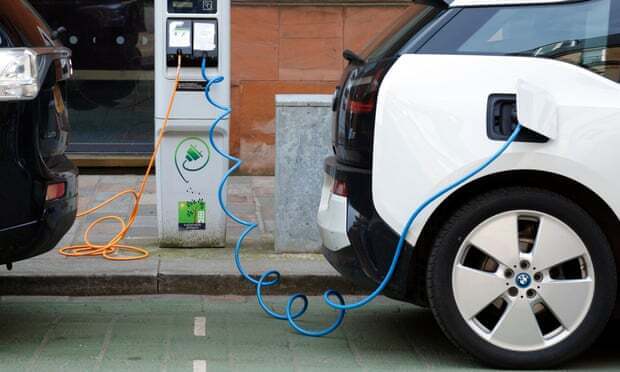
New ISO ESG Implementation Principles provide int’l guidance to streamline ESG practices
New ESG Implementation Principles launched the International Organization for Standardization (ISO) at the 29th United Nations ...

Dave Taylor, a resident in the London Borough of Ealing, contacted the Observer after reading an article on charging electric vehicles. “My photo of the car with the charging cable across the pavement highlights a very real issue that is not being addressed,” he says.
“I recently contacted my local authority about a dangerously trailing cable and was told safety is the responsibility of the individual driver, not the charging point provider or the council, even though local authorities are the responsible body for public health and safety.
“The industry benchmark is that vehicles should be parked adjacent to the charging point but Ealing says if they were to introduce dedicated bays, resident permit holders would offer resistance to losing space.”
Motorists can charge their vehicles on- or off-road from points in their homes, or from the growing number of publicly available installations.
Ealing Council told the Observer that it was in the process of updating its website to make it clear that cables should not be extended across footways from home and said its 183 communal charge points were fitted with short cables to prevent them from becoming a trip hazard.
However, the photograph of a street in the borough supplied by Taylor shows a cable trailing several feet along the kerb to a car parked further down the street.
“If someone were to trip and suffer an injury it would be up to them to pursue the person who plugged it in through litigation. Pretty difficult and costly,” he says. “Councils are sidestepping responsibility.”
Gaps in government guidelines mean that there are no specific restrictions on how and where vehicles can be charged in public spaces. The Department for Transport told the Observer that the safety of all road users was a priority, but its guidance for drivers and councils only addresses the technical and funding issues of charge points, with no word on the needs of other road users.
Responsibility for maintaining safe environments falls to councils, which can potentially impose £100 fixed penalties for wilfully obstructing the highway or depositing things which cause injury or danger.
A number of local authorities are themselves contributing to the problem by installing bulky charge points on pavements, squeezing out pedestrians to free up road space for traffic and avoid antagonising parking permit holders. While some charge points do come with dedicated parking bays, many are designed to provide what Ealing calls “flexibility”. Flexibility, that is, for drivers who can park in any available slot – or even on pavements – and extend the cable along the footway to reach their car.
Government grants for domestic charge points are only available to homeowners with off-street parking and, to encourage demand, councils are under growing pressure to provide urban households with on-street facilities.
The Office for Low Emission Vehicles has made £4.5m available to councils for 2019-20 and, amid the rush to claim a share, the charity Living Streets has launched a campaign to protect footways from being sacrificed for the benefit of drivers. Its website provides template letters to raise concerns with local councils.
“If the vision is that we all move towards electric vehicles in the future, then there is the potential for cables to be trailing from every home across every pavement,” says Living Streets’ Kathryn Shaw. “We need to get this right, or we’ll be stuck forever with unsuitable and dangerous infrastructure.”
The charity is calling for charging points to be installed in car parks or off pavements and also wants the government to follow Scotland’s lead in banning any parking on pavements from 2021.
And as the adoption of electric vehicles rises year on year, their soundless motors can pose problems for pedestrians, according to the Royal Society for the Prevention of Accidents.
Since July, all new prototypes must emit a noise before being approved in Europe, but there is no such requirement for the estimated 255,000 now on British roads, or models currently being manufactured. Helen Honstvet of the charity Guide Dogs says: “We are concerned that the roll-out of sound generators, in line with the EU regulations, is not happening quickly enough – sound generators are only required on new models, whereas they should be compulsory on all new electric cars and drivers should face consequences if they fail to maintain an audible warning system.”
David Bailey, a professor at Birmingham Business School and the driver of his own Nissan Leaf electric car, says that while the UK’s charging infrastructure needs investment, electric cars are not going away.
“It’s quite the opposite – 2020 is going to see a big rise in electric car sales across Europe as car manufacturers face heavy penalties if the average carbon dioxide emissions from all the cars they sell is above 95g per kilometre. By mid-2020, electric cars are expected to match combustion-engined cars in terms of price and ease of use. While the UK still lags behind some European countries – particularly for fast chargers – we will simply have to sort out the charging infrastructure to match the numbers being driven,” he says.
Not everyone is so sure. Shaw is adamant we should be focusing on other ways to get around. “Electric vehicles do not solve congestion or all our air-quality problems – the suggestion they do is incredibly misleading,” she says. “Fundamentally, we need to change the way we travel. The new government needs to prioritise active travel to tackle unacceptable road danger, climate change, toxic levels of air pollution and the health crisis due to sedentary lifestyles.
New ESG Implementation Principles launched the International Organization for Standardization (ISO) at the 29th United Nations ...
PUMA has already made strong progress in reducing its greenhouse gas emission over the past ...
The United Nations Trade and Development (UNCTAD) urged during the 29th United Nations Climate Change ...


اترك تعليقا